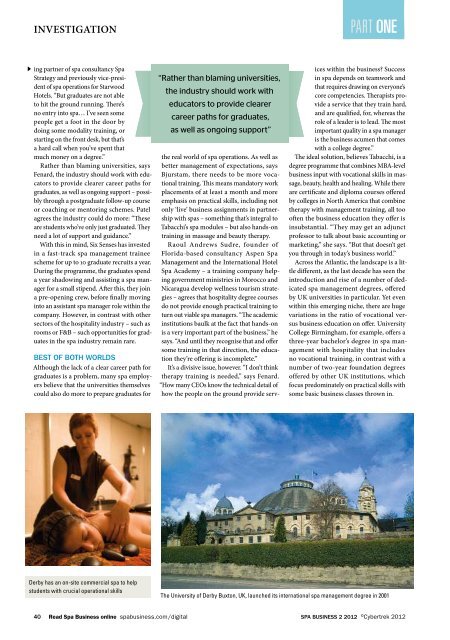Spa Business issue 2 2012 - Leisure Opportunities
Spa Business issue 2 2012 - Leisure Opportunities
Spa Business issue 2 2012 - Leisure Opportunities
You also want an ePaper? Increase the reach of your titles
YUMPU automatically turns print PDFs into web optimized ePapers that Google loves.
INVESTIGATION PART ONE<br />
ing partner of spa consultancy <strong>Spa</strong><br />
Strategy and previously vice-president<br />
of spa operations for Starwood<br />
Hotels. “But graduates are not able<br />
to hit the ground running. Th ere’s<br />
no entry into spa… I’ve seen some<br />
people get a foot in the door by<br />
doing some modality training, or<br />
starting on the front desk, but that’s<br />
a hard call when you’ve spent that<br />
much money on a degree.”<br />
Rather than blaming universities, says<br />
Fenard, the industry should work with educators<br />
to provide clearer career paths for<br />
graduates, as well as ongoing support – possibly<br />
through a postgraduate follow-up course<br />
or coaching or mentoring schemes. Patel<br />
agrees the industry could do more: “Th ese<br />
are students who’ve only just graduated. Th ey<br />
need a lot of support and guidance.”<br />
With this in mind, Six Senses has invested<br />
in a fast-track spa management trainee<br />
scheme for up to 10 graduate recruits a year.<br />
During the programme, the graduates spend<br />
a year shadowing and assisting a spa manager<br />
for a small stipend. Aft er this, they join<br />
a pre-opening crew, before fi nally moving<br />
into an assistant spa manager role within the<br />
company. However, in contrast with other<br />
sectors of the hospitality industry – such as<br />
rooms or F&B – such opportunities for graduates<br />
in the spa industry remain rare.<br />
BEST OF BOTH WORLDS<br />
Although the lack of a clear career path for<br />
graduates is a problem, many spa employers<br />
believe that the universities themselves<br />
could also do more to prepare graduates for<br />
Derby has an on-site commercial spa to help<br />
students with crucial operational skills<br />
40 Read <strong>Spa</strong> <strong>Business</strong> online spabusiness.com / digital<br />
“Rather than blaming universities,<br />
the industry should work with<br />
educators to provide clearer<br />
career paths for graduates,<br />
as well as ongoing support”<br />
the real world of spa operations. As well as<br />
better management of expectations, says<br />
Bjurstam, there needs to be more vocational<br />
training. Th is means mandatory work<br />
placements of at least a month and more<br />
emphasis on practical skills, including not<br />
only ‘live’ business assignments in partnership<br />
with spas – something that’s integral to<br />
Tabacchi’s spa modules – but also hands-on<br />
training in massage and beauty therapy.<br />
Raoul Andrews Sudre, founder of<br />
Florida-based consultancy Aspen <strong>Spa</strong><br />
Management and the International Hotel<br />
<strong>Spa</strong> Academy – a training company helping<br />
government ministries in Morocco and<br />
Nicaragua develop wellness tourism strategies<br />
– agrees that hospitality degree courses<br />
do not provide enough practical training to<br />
turn out viable spa managers. “Th e academic<br />
institutions baulk at the fact that hands-on<br />
is a very important part of the business,” he<br />
says. “And until they recognise that and off er<br />
some training in that direction, the education<br />
they’re off ering is incomplete.”<br />
It’s a divisive <strong>issue</strong>, however. “I don’t think<br />
therapy training is needed,” says Fenard.<br />
“How many CEOs know the technical detail of<br />
how the people on the ground provide serv-<br />
ices within the business? Success<br />
in spa depends on teamwork and<br />
that requires drawing on everyone’s<br />
core competencies. Th erapists provide<br />
a service that they train hard,<br />
and are qualifi ed, for, whereas the<br />
role of a leader is to lead. Th e most<br />
important quality in a spa manager<br />
is the business acumen that comes<br />
with a college degree.”<br />
Th e ideal solution, believes Tabacchi, is a<br />
degree programme that combines MBA-level<br />
business input with vocational skills in massage,<br />
beauty, health and healing. While there<br />
are certifi cate and diploma courses off ered<br />
by colleges in North America that combine<br />
therapy with management training, all too<br />
oft en the business education they off er is<br />
insubstantial. “They may get an adjunct<br />
professor to talk about basic accounting or<br />
marketing,” she says. “But that doesn’t get<br />
you through in today’s business world.”<br />
Across the Atlantic, the landscape is a little<br />
diff erent, as the last decade has seen the<br />
introduction and rise of a number of dedicated<br />
spa management degrees, off ered<br />
by UK universities in particular. Yet even<br />
within this emerging niche, there are huge<br />
variations in the ratio of vocational versus<br />
business education on off er. University<br />
College Birmingham, for example, off ers a<br />
three-year bachelor’s degree in spa management<br />
with hospitality that includes<br />
no vocational training, in contrast with a<br />
number of two-year foundation degrees<br />
offered by other UK institutions, which<br />
focus predominately on practical skills with<br />
some basic business classes thrown in.<br />
The University of Derby Buxton, UK, launched its international spa management degree in 2001<br />
SPA BUSINESS 2 <strong>2012</strong> © Cybertrek <strong>2012</strong>

















